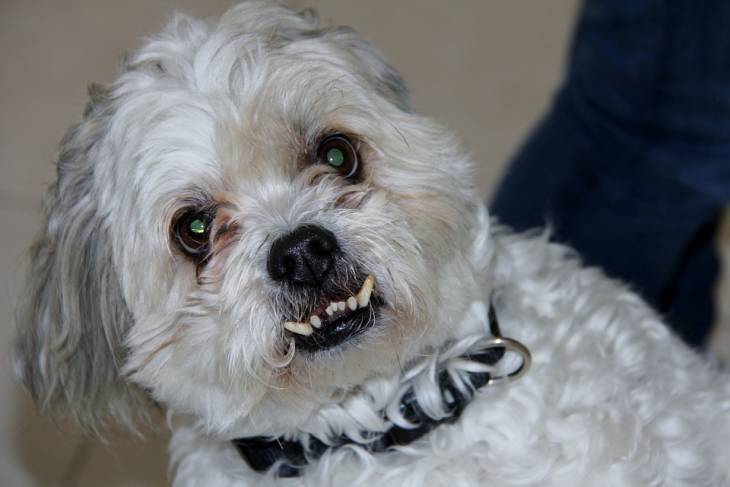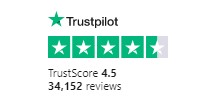Aggressive Puppy Behavior (An In-Depth Look)
Your little puppy has brought you great happiness since you’ve brought him home. But amongst his spurts of energy and goofball behavior, he’s mixed in some growling, nipping, and biting. This has made you concerned that he may grow up to be an aggressive dog. Are those concerns warranted?
Aggressive Biting Vs. Play Biting
If you've never owned a puppy, you may freak out the first time your four-legged friend bares his teeth and gnaws at your hand. This may even fill you with dread, make you question your skills as a dog owner and all kinds of unpleasant stuff.
Don’t doubt your acumen as a pet owner - almost all puppies engage in an activity called play biting. They’ll do this to other dogs of all ages, and they’ll do it to you, too. This doesn’t mean they don’t like you or other canines; it’s simply a manifestation of ancient instincts.
Play biting directly traces back to the old-school days of dogs being socially carnivorous pack animals. Back then, canines used their strong jaws to bring down prey. Because they’re pack animals, however, once prey had been subdued, there had to be “discussions” over how that food was distributed.
Dogs communicated this through the use of inhibited biting, along with other means of ritualistic aggression such as growling and body posturing. These softer bites were their way of getting their points across without causing physical harm to their pack mates.
This delicate form of biting is something that dogs developed during their puppy stage, via a technique that is referred to as play biting today. This play biting does take a while to dial down to a proper range – pups don’t necessarily know their inherent jaw strength – but they might end up using you as a means to figure this adjustment out.
Puppy Language vs. Human Language
The first time our puppy bites or growls at us may catch us off-guard. It may make us a little angry or upset. However, when this happens, it’s important to note that more often than not, play biting is not just instinctual – your pup may be trying to communicate with you.
Like other parts of the body, such as the tail, a dog will use his teeth or a growly voice to let you know what’s on his mind. Chances are, he’s just letting you know that he wants something, is having fun, or is tapping into his breed roots. For instance, a working breed pup that nips your heels while chasing you down may be manifesting his herding instincts.
The vast majority of the time, this behavior is perfectly harmless, and should be phased out by engaging him in the basic training and socialization techniques you’re hopefully planning on conducting already. However, there is a small sliver of the canine population that manifests its puppy aggression beyond these particular metrics.
A Video Overview of Puppy Aggression
We don't like to think of our cute little puppies growing up to be aggressive adult dogs, but there are instances in which this could happen. This video does a good job of breaking down these instances in a pretty straightforward manner. Hopefully, these instances won't ever manifest, but it's good to at least have them on your radar.
The Natural Reasons that a Puppy Might Be Aggressive
There are a few reasons why your puppy may lean toward aggressive behavior. It's important that you're cognizant of these reasons because they could help you figure out the best ways to help your pup curb these behaviors.
One of the reasons for puppy aggression could be due to the genetic code embedded in the dog’s breed-specific DNA. Some breeds do have a dominant streak or aggressive tendencies in their bloodline. These don’t mean they were bred to be bad dogs; chances are, it has to do with certain tasks they were bred to do, like hunting or herding.
To that end, some of this behavior could also stem from a “pack dog” mentality. Some breeds are predisposed to becoming the “alpha dog” if the owner doesn’t use proper training and socialization techniques to create a hierarchy. The seeds of this predisposition can be sewn quite easily in the puppy stage.
Sometimes, puppy aggression has nothing to do with the breed’s “code.” Rather, it could be a sign of something serious happening with your pooch related to their health. This could be a neurological problem or a chronic disease, or it could be a sign that the pup is in some sort of pain.
If you suspect this latter issue to be the cause of the puppy’s aggressive tendencies, schedule an appointment with your veterinarian right away. Your vet will be able to diagnose the cause of the issue – and by extension, the cause of the overt aggression – which could lead your pup down the road to recovery in more ways than one.
Can Puppies Learn to Become Aggressive?
Unfortunately, it’s quite possible for a puppy that looks sweet and innocent to turn into an aggressive little beast under certain learned circumstances. This doesn’t happen overnight, as it is a learned process that can take time to fully develop. What’s more, these means of learned aggression can manifest itself in different ways.
The most obvious one of these learned tendencies stems from being mistreated or abused by an owner. In these cases, the biting, growling, and other forms of aggression will most likely stem from the pup merely trying to protect himself out of fear that more bad stuff will happen.
This level of abuse isn’t exclusively confined to the worst kinds of abuse that humans can foist upon a pup. Using harsh physical punishment or loud berating during training sends a frightening message to puppies; one that may lead them to produce aggressive behaviors to protect themselves.
Another learned aggression that can crop up is resource guarding. Essentially, this technique is deployed by a pup that learns how to aggressively protect his food, toys, or other possessions from others, “Survival of the Fittest”-style. This may develop in puppies that spent a lot of time with a very large litter or a big group of pups.
The Right Way to Curb Puppy Aggression

In a way, the best way to stamp out puppy aggression is to prevent it from manifesting in the first place. Most of the techniques that you can deploy to help curb aggression are rooted in demonstrating a certain level of kindness and respect to your four-legged friend.
For instance, it should be reiterated that being able to recognize normal puppy behavior is extremely important to stave off puppy aggression. Behaviors like play biting are instinctual and are meant to be tools of communication. When your puppy nips at your heels, he’s not doing it out of spite – he’s simply being a young dog.
The way you train your puppy can be very vital to halting instances of puppy aggression. Making training sessions fun, engaging, and on a level that best suits the breed can go a long way into helping them develop the behaviors you want efficiently.
Also, never fall into the temptation of giving into frustrations that may develop during training. While some breeds require more patience than others, all breeds respond to positive techniques built on a foundation of praise and rewards. This will also allow you to create a deeper, more enriching bond with your pup.
Making sure your puppy is socialized is also a key component to lessening aggression. Getting your pup used to be around other people and animals will help to lower defenses even before they’re raised all that high. This tack is particularly important if you have a breed that’s known for being shy or nervous around strangers.
Neutering, Spaying, and Aggressive Behavior
We all know the importance of “fixing” our pups to control the pet population. From an aggression standpoint, following through on this action could add a different dimension to the process of curbing the way a dog acts.
In a male dog, neutering essentially limits the amount of testosterone coursing through his body. This hormone can cause a male dog to react to situations quicker and with a higher level of intensity, particularly when they hit their adolescent phase. Neutering results in a calmer dog, and theoretically, one that may be slower to aggression.
Female dogs, on the other hand, work differently. Behaviorists point out that a spayed pup could produce a bump in aggressive behavior, particular when there the potential for aggression is rooted in conflict. With that being said, a spayed puppy can still jettison any proclivities toward aggression with proper training and socialization.
Don’t Freak Out – Knowledge is Power!
When your puppy decides to play bite you – and chances are great that he will – stay calm and realize that this is a perfectly normal behavior and not a sign of aggression. If you go about training and socializing your pup in a way that honors and respects him, you won’t have to worry about your adorable pup going rogue as an adult.



